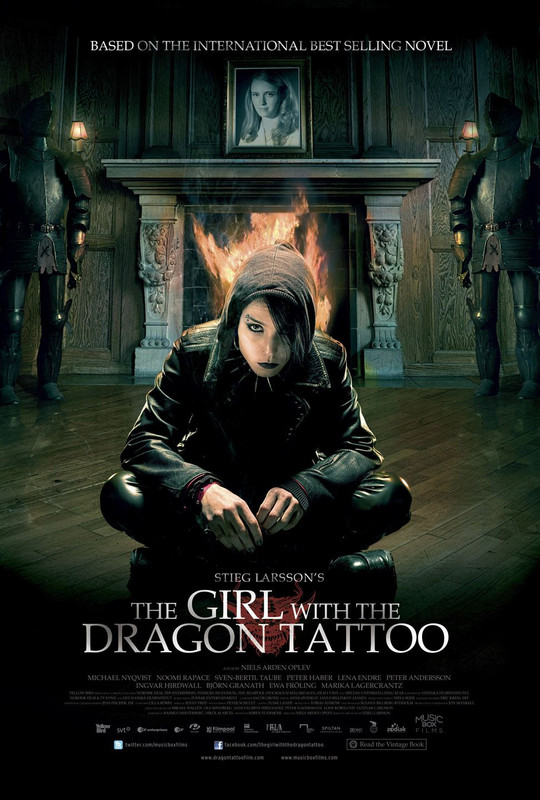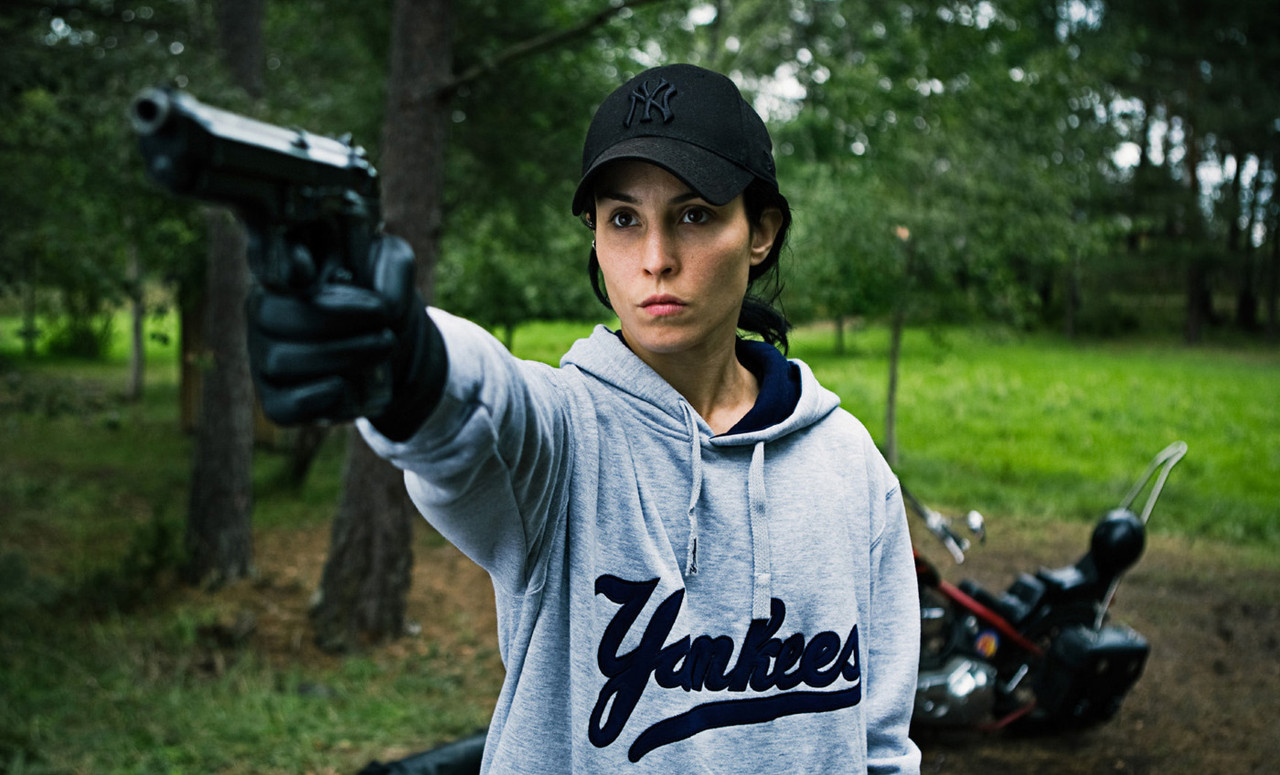Over the last couple of years it seems like I've spent quite a lot of time writing about the various depictions of the story and character of Lisbeth Salander, and Steig Larsson's Millennium trilogy. Having handed something of a kicking to David Fincher's adaptation of the first book; The Girl With the Dragon Tattoo (still carrying the neutered English title, rather than the much better original title Man Som Hatar Kvinnor - Men Who Hate Women), I thought it was high time to revisit the original films, and to take a first look at them in the extended versions in which they were shown on Swedish television.
In the interest of full disclosure, I had seen Dragon Tattoo a couple of times since its cinema release, but had not, until now, revisited the sequels.
The Girl With the Dragon Tattoo
Dir: Niels Arden Oplev
For me this is (and will surely remain, at least until, 20 years down the line, Hollywood decides that the story needs a reboot) the definitive screen version of this story. The strengths of the cinema version remain here, particularly in the way that Nikolaj Arcel and Rasmus Heisterberg's adaptation strips away the political ranting that can make Larsson's novel a chore at times, to focus in on the characters and the entertainingly implausible mystery at the film's centre. The writing brings each of the characters a bit closer to reality; Lisbeth no longer seems quite so superhuman as Larsson paints her, and Blomkvist no longer hooks up with everything in a skirt. The best thing about the adaptation though is how simply and clearly it renders the exposition about the Vanger family and the disappearance of Harriet Vanger, and how it resits using the reams of expository dialogue that Fincher's film falls back on to do this.
The casting and performances are what make the film tick and they are all at the very least solid efforts, and most are much better than that. Many of the cast benefit from the extra 30 minutes added to this version of the film, but none so much as Lena Endre, whose Erika Berger is more of a presence, much more fleshed out, and her relationship with Blomkvist more important, this is just one example of the many ways that the extended and added scenes provide more colour, making the film more engaging. Also excellent - contrary to what I had remembered, and reported in my review of Fincher's film - is Sven Bertil Taube as Martin, giving a performance that is, on reflection, more inheld and therefore more surprising than Stellan Skarsgaard's.
The leads are both excellent. The rumpled Michael Nyqvist makes a great Blomkvist, putting across his tunnel vision and sense of mission across ably, without losing sight of the character's intellect, or his affection for Berger, Salander and even Harriet Vanger (the connection between them is retained here, and brings a personal dimension missing from Fincher's film). However, even though her presence feels a little reduced in this extended version (because it is largely Blomkvist's side that is boosted), the film completely belongs to Noomi Rapace as Lisbeth Salander. There's an edge of danger to her at all times, an unpredictability, and much more sense of what might well be Aspergers. The relationship with Blomkvist, as in the book, is prickly and distant, and even after they become lovers she remains totally closed off to him. While the character never lets others in, Rapace does allow us to get a sense of what is going on beneath the surface, rather than simply allowing Lisbeth to be moody.
Neils Arden Oplev's direction, while unblinking when it comes to the film's several brutally violent passages, isn't the most visually striking thing, but it serves the storytelling perfectly well, even if it serves up few truly memorable images. That said, the image of the killer's collection of memorabilia - though, ironically, right out of the Fincher playbook - is nightmarish and lingers in the memory. Oplev seems to have opted to fcus on the performances, and that's a great choice when they are so strong. Overall, Oplev has a firm grasp on his film, even at three hours the pace never really flags, and he keeps the investigation thread taut and logical - at least in its progression - throughout, while hitting all the character beats well, and dealing briskly with the novel's long coda, wrapping up the film in short order while also supplying the information we'll need for the sequels.
This definitely isn't a perfect film, but it addresses many of the flaws of its source by intelligently pruning the narrative and injecting a little more reality into Larsson's characters.
★★★★☆
★★★★☆
The Girl Who Played With Fire / The Girl Who Kicked the Hornet's Nest
Dir: Daniel Alfredson
It makes sense to tackle the second and third parts of the Millennium trilogy as a single, massive, arbitrarily divided narrative, not least because that was exactly what the novels were. Unfortunately, as well as being based on two novels full of increasingly hilarious implausibities, these films saw a shift in behind camera talent, with Ulf Ryberg taking writing duties and Daniel Alfredson (brother of Let the Right One In helmer Tomas) handling the direction. While Dragon Tattoo was broadcast on TV in the extended version detailed above, these films were made for TV, and it shows in many ways.
First of all Alfredson's films are shot on notably grainier stock, but there's also just a flatness about both his camera and his cutting style. However, most of the problems stem from the novels, which take Lisbeth even further into superhuman territory, and pile conspiracy upon conspiracy and coincidence upon coincidence until it all becomes risible. That said, the films remain pretty engaging largely thanks to a fine cast and the solid telling of what is admittedly a silly story. The Girl Who Played With Fire is by far the better film, and benefits hugely from 53 minutes of extended and added scenes, which balance the narrative to a much greater degree and allow the plot to track much more easily than in the cinema version (which also conspires to make Hornet's Nest feel much more satisfying at this level than it was at the cinema, as the two inform each other), it's also got real urgency in the second half, as Lisbeth tracks down and determines to kill her nemesis (though this sequence eventually falls victim to some of Larsson's silliest writing).
What keeps these films (especially the rather dull Hornet's Nest) afloat are the continued efforts of a fine cast, Lene Endre and the rest of Blomkvist's Millennium colleagues continue to benefit from an increased presence and import in the story, and Annika Hallin does nice work as Blomkvist's sister, who becomes Salander's lawyer, but once again it is the leads, and most particularly Rapace, who command the attention.
Michael Nyqvist basically continues where he left off with Blomkvist, he remains the stoic and principled hero, it's Noomi Rapace who really evolves here. Rapace is as effortlessly charismatic as she was in the first film, and perhaps more so than before seems to have simply stepped out of the books. In the last three parts of the series (that is the second half of Played With Fire and most of Hornet's Nest) Rapace is largely silent, but there is as much going on as there ever was when she was speaking simply in the way she sizes up people and situations, and we still feel the potential for danger in all that she does. Even at the most outlandish moments, even when Salander is basically a superhero, Rapace keeps things just about grounded.
The added scenes can't fix the silliness, nor can they mend the utterly broken pace of Hornet's Nest, which moves like a snail on valium before coming round for a solid final confrontation, but they do mean that the films at least make more sense, and they also benefit from being watched together. On the whole though, despite the best efforts of all concerned, and another great turn from Noomi Rapace, these are increasingly disappointing follow ups to The Girl With the Dragon Tattoo.
Girl Who Played With Fire:★★★☆☆
Girl Who Kicked the Hornet's Nest: ★★☆☆☆
Girl Who Played With Fire:★★★☆☆
Girl Who Kicked the Hornet's Nest: ★★☆☆☆



I feel like I should give the Swedish films another go, as much as I hated the novel (I couldn't get past the first one, unfortunately) and the American remake, after reading this. I'm more interested in Rapace's Lisbeth, even though I really liked Rooney Mara's interpretation
ReplyDelete